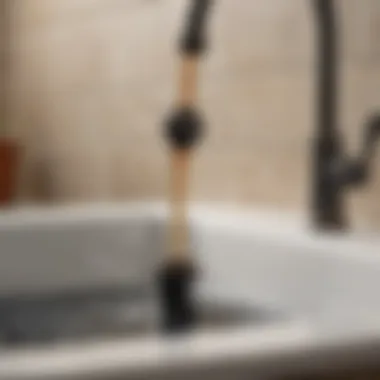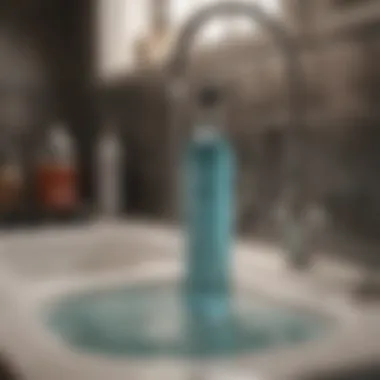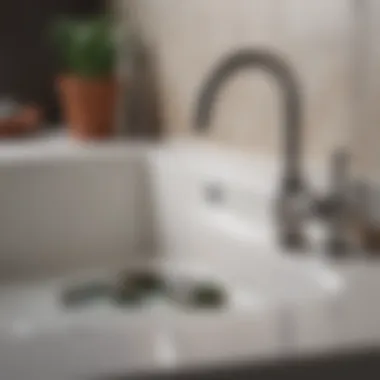Effective Strategies for Unclogging a Sink: The Ultimate Guide for Clear Drains


Inspiring Homes
In the realm of effective home maintenance, the issue of a clogged sink can pose a significant inconvenience. Embracing the essence of seamless living, it becomes paramount to address sink blockages promptly. We delve into a comprehensive guide on unclogging sinks, unveiling a spectrum of methods from DIY solutions to expert strategies.
Showcasing Simple DIY Solutions
Embarking on the journey of maintaining a functional home, DIY solutions stand as pillars of trust and affordability. From utilizing a mixture of baking soda and vinegar to employing the mighty force of a plunger, these methods offer quick remedies to troublesome sink clogs. Explore the simplicity and efficacy of these DIY approaches, ensuring a hassle-free unclogging process.
Unveiling Professional Tips for Precision
Peering into the realm of expertise, professional tips bring forth a sense of finesse and effectiveness in handling sink blockages. With insights from plumbing professionals, understand the nuances of drain snake usage and the significance of enzymatic cleaners. Elevate your unclogging game with these tailored recommendations, guaranteeing long-lasting results and optimal drainage in your sink.
Introduction
Within this comprehensive guide, readers will journey through an array of DIY solutions curated to offer a cost-effective and environmentally friendly approach to unclogging sinks. From the simple yet powerful Boiling Water Method to the chemical-free prowess of Baking Soda and Vinegar, each technique is meticulously detailed to empower individuals with the knowledge and skills necessary to tackle sink blockages head-on. Furthermore, the Plunger Technique and Homemade Drain Cleaner methods serve as invaluable tools in one's arsenal when faced with stubborn clogs, reinforcing the importance of proactive maintenance in maintaining optimal sink functionality.
In the pursuit of unclogging sinks, the utilization of specialized tools cannot be understated. Equipped with insights on tools like the Sink Plunger, Plumbing Snake, and Chemical Drain Cleaners, readers will be equipped with the essential resources needed to effectively dislodge and clear sink blockages, restoring normal drainage patterns. Additionally, the article delves into the realm of professional assistance, exploring the scenarios that warrant the intervention of skilled experts in plumbing systems and the advantages of professional services when faced with persistent or complex clogs.
As readers navigate through the preventive measures outlined in this guide, they will discover practical tips designed to minimize the likelihood of future sink clogs, emphasizing the importance of regular maintenance and mindful practices to uphold the longevity of sink drainage systems. By implementing the preventive strategies discussed, individuals can circumvent the inconvenience and frustration associated with sink blockages, fostering a smooth and uninterrupted flow of water within their household.
Embark on this journey through the intricate world of sink maintenance, armed with insightful knowledge, practical solutions, and expert advice to conquer sink clogs with confidence and efficiency!
Understanding Sink Clogs
Sink clogs are a common household inconvenience that can disrupt the smooth functioning of daily activities. In this article on effective ways to unclog a sink, the section on Understanding Sink Clogs serves as a crucial foundation for tackling this issue efficiently. By delving into the reasons behind sink blockages, readers can gain valuable insights into preventive measures and proactive solutions to maintain optimal drainage in their homes.


Common Causes of Sink Clogs
One of the primary culprits behind sink clogs is the accumulation of organic material such as food scraps, grease, and soap residue. These substances can gradually build up inside the pipes, forming stubborn blockages that impede water flow. Additionally, mineral deposits from hard water can contribute to clogging, further exacerbating the issue. Understanding these common causes is key to implementing targeted solutions that address the root of the problem and prevent recurring blockages.
Types of Sink Blockages
Sink blockages can manifest in various forms, each requiring specific treatment for effective resolution. From simple debris blockages that can be cleared with basic DIY methods to more complex issues like tree root infiltration or pipe misalignment, the types of sink blockages are diverse and demand different approaches. By familiarizing oneself with the different manifestations of sink clogs, individuals can better diagnose the problem and employ suitable techniques to unclog their sinks efficiently.
DIY Solutions
DIY solutions play a crucial role in the effective unclogging of sinks. In this article, we delve into the significance of DIY approaches, offering readers practical and cost-effective methods to address sink blockages. DIY solutions not only enable individuals to tackle clogs independently but also promote sustainability by reducing the reliance on professional assistance. By focusing on DIY strategies, individuals can promptly address sink issues, saving time and money in the process.
Boiling Water Method
The boiling water method stands out as a simple yet effective DIY solution for unclogging sinks. By boiling water and carefully pouring it down the drain, individuals can dislodge debris and grease buildup, facilitating the smooth flow of water. This technique is environmentally friendly and requires minimal effort, making it a go-to option for mild sink blockages. It is essential to exercise caution when handling boiling water to prevent accidents and ensure optimal results.
Baking Soda and Vinegar
Using a combination of baking soda and vinegar proves to be a powerful DIY remedy for stubborn sink clogs. When mixed and poured down the drain, these household ingredients create a foaming reaction that helps break down organic materials and clear blockages. This natural alternative to chemical cleaners is safe for pipes and septic systems, offering a gentle yet effective solution for maintaining clear drains.
Plunger Technique
The plunger technique is a classic DIY method for resolving sink clogs, especially those caused by solid obstructions. By creating a seal around the drain and exerting forceful plunging motions, individuals can dislodge blockages and restore proper drainage. It is essential to choose the right type of plunger for the sink, ensuring a tight seal for effective suction. Regular maintenance with a plunger can prevent severe clogs and promote healthy plumbing systems.
Homemade Drain Cleaner
Crafting a homemade drain cleaner provides an eco-friendly and budget-friendly option for unclogging sinks. By combining ingredients like baking soda, vinegar, and hot water, individuals can create a potent cleaning solution to dissolve grease, grime, and debris in the pipes. This DIY cleaner offers a safer alternative to commercially available chemical products, reducing exposure to harsh toxins and protecting the environment. Regular use of homemade drain cleaner can help prevent recurrent clogs and maintain optimal sink performance.


Tools for Unclogging
When faced with a clogged sink, having the right tools can make all the difference between a swift fix and a prolonged inconvenience. In this section, we delve into the significance of selecting the appropriate tools for unclogging sinks effectively. From sink plungers to plumbing snakes and chemical drain cleaners, each tool serves a unique purpose in combating different types of blockages.
Sink Plunger
A sink plunger is a fundamental tool in every household's plumbing arsenal. Its design allows for creating the necessary suction to dislodge common sink clogs caused by organic matter or grease buildup. When using a sink plunger, it's essential to ensure a tight seal around the drain opening and apply firm pressure in a repetitive motion to break the obstruction free. Remember, the key to successful plunging lies in consistency and controlled force to avoid causing any damage to the plumbing system.
Plumbing Snake
For more stubborn blockages that resist plunging, a plumbing snake comes to the rescue. This flexible and slender tool is adept at navigating through the twists and turns of pipes to reach deep-seated clogs. By carefully maneuvering the snake into the drain and rotating it to hook or push the obstruction, you can effectively clear the pathway for smooth water flow. Before using a plumbing snake, it's crucial to read the instructions carefully and handle the tool with caution to prevent any injuries or pipe damage.
Chemical Drain Cleaners
When traditional methods fall short, chemical drain cleaners offer a potent solution for tackling persistent sink blockages. These powerful formulas work by dissolving organic matter, grease, and soap scum, restoring proper water flow within the pipes. However, it's important to exercise caution while using chemical drain cleaners, as they can be harsh on plumbing materials and harmful if not handled properly. Always follow the manufacturer's instructions, wear protective gear, and ensure adequate ventilation when applying these chemicals.
Equip yourself with the knowledge of these essential tools for unclogging sinks, and you'll be well-prepared to address any drainage issues efficiently and effectively.
Professional Assistance
Professional assistance plays a crucial role in ensuring that sink clogs are effectively addressed. While DIY methods are popular, some cases require the expertise of a professional plumber to resolve complex blockages. Professionals bring a wealth of experience and specialized tools to tackle stubborn clogs that may not respond to simple home remedies. Their knowledge allows them to identify the root cause of the clog and implement targeted solutions.
When faced with persistent or recurring sink clogs, it is advisable to engage a professional. Additionally, if DIY methods have been unsuccessful in clearing the blockage despite repeated attempts, seeking professional assistance becomes necessary. Ignoring stubborn clogs can lead to further plumbing issues and potentially costly repairs down the line. By recognizing the limitations of DIY approaches and knowing when to call in a professional, homeowners can ensure the timely and effective resolution of clogging issues.
When to Call a Professional


It is essential to know when it is time to call a professional plumber for assistance with sink clogs. Professional intervention is warranted in cases where DIY methods have proven ineffective or where the clog persists despite repeated attempts. Complex blockages that involve underlying plumbing issues, such as tree root infiltration or pipe damage, require the expertise of a professional to address effectively. Additionally, if there is a foul odor emanating from the sink or drains, it may indicate a more severe clog that needs professional attention.
Recognizing the signs that DIY solutions are insufficient can help homeowners avoid exacerbating the problem and potentially causing further damage. By understanding when to enlist professional services, individuals can ensure prompt and efficient resolution of sink clogs, preventing escalation into more significant plumbing issues.
Benefits of Professional Services
Engaging professional plumbing services for addressing sink clogs offers several benefits. Professionals have the necessary expertise to identify and resolve intricate clogs effectively. They utilize specialized tools and techniques to clear blockages and ensure smooth drainage, reducing the risk of recurrent clogging.
Furthermore, professional plumbers can conduct thorough inspections to pinpoint underlying issues contributing to sink clogs, allowing for targeted repairs or preventative measures. Their in-depth knowledge of plumbing systems enables them to provide long-term solutions that minimize the likelihood of future clogs, ultimately saving homeowners time and money on frequent maintenance.
By relying on professional services, homeowners can rest assured that their sink clogs will be addressed comprehensively, with the added benefit of expert advice on maintenance practices to prevent future blockages. The investment in professional assistance pays off in the form of efficient and lasting solutions to stubborn sink clogs.
Preventive Measures
In this crucial section of the article on effective ways to unclog a sink, we delve into the significance of preventive measures. Preventive measures are the cornerstone of a well-maintained and smoothly functioning sink system. By implementing proactive steps to prevent clogs, individuals can save time, money, and effort in the long run. This article emphasizes the importance of taking preventive action to avoid frequent blockages and maintain optimal sink performance for an extended period.
Preventive measures encompass various aspects that contribute to the overall health of sink drainage systems. By adhering to these measures, individuals can prolong the lifespan of their sinks, reduce the need for frequent repairs, and enhance the overall functionality of their plumbing. Whether it's being mindful of what goes down the drain, adopting regular maintenance routines, or installing drain guards, each preventive measure plays a vital role in ensuring the smooth operation of sinks. By following these tips diligently, individuals can mitigate the chances of encountering stubborn clogs and related plumbing issues. The preventive measures discussed in this article are curated to empower readers with practical insights and actionable steps to safeguard their sink systems effectively.
Tips to Avoid Future Clogs
To maintain a clog-free sink and prevent future blockages, here are some essential tips to incorporate into your routine. Firstly, avoid pouring grease or oily substances down the drain, as these can solidify and congeal, leading to stubborn clogs over time. Opt for disposing of grease in a separate container instead. Additionally, make it a habit to run hot water down the drain after each use to help clear away any residual particles and prevent buildup. Regularly flush drains with a mixture of baking soda and vinegar to break down grease and debris, keeping the pipes clean and odor-free. Inspecting sink stoppers and cleaning them routinely can also help prevent hair and soap scum from accumulating and causing blockages. Another useful tip is to use drain strainers or guards to catch debris before it enters the pipes, reducing the risk of obstructions. By following these preventive measures and tips diligently, individuals can effectively maintain an unclogged sink and ensure optimal drainage performance for the long haul.
Conclusion
In the realm of plumbing and household maintenance, the conclusion of this article serves as the culmination of a comprehensive journey through the intricacies of unclogging sinks. As readers reflect on the plethora of information provided in the previous sections, it becomes evident that the topic of unclogging sinks holds critical importance in ensuring the smooth functioning of drainage systems. By delving into the various DIY solutions, tools for unclogging, professional assistance options, and preventive measures discussed throughout this guide, individuals gain a profound understanding of the significance of proactively addressing sink blockages.
One key element highlighted in this conclusion is the cost-effectiveness of employing DIY solutions and preventive measures when dealing with sink clogs. By integrating simple methods such as the boiling water technique, baking soda, and vinegar mix, or regular maintenance practices, homeowners can potentially save significant expenses associated with hiring professional services or purchasing specialized tools. This not only enables individuals to manage minor sink clogs efficiently but also empowers them to take proactive steps in preserving the longevity of their plumbing systems.
Furthermore, the insightful exploration of professional assistance underscores the importance of knowing when to seek expert help for complex sink blockages. Understanding the benefits offered by professional plumbers, including their expertise, specialized equipment, and guarantee of long-term solutions, provides readers with a nuanced perspective on the value of professional services when faced with challenging plumbing issues.
Lastly, the emphasis on preventive measures elucidates the long-term benefits of incorporating simple tips and habits into one's lifestyle to avoid future sink clogs. By implementing small changes such as using drain filters, being mindful of what goes down the sink, and conducting regular maintenance checks, individuals can significantly reduce the likelihood of encountering stubborn blockages, thereby promoting efficient drainage and a hassle-free plumbing experience.
In essence, the conclusion of this article encapsulates the essence of effective sink unclogging techniques, underlining the intersection of practicality, efficiency, and foresight in maintaining optimal sink functionality. By embracing the insights shared throughout this comprehensive guide, readers will be well-equipped to tackle sink blockages with confidence and safeguard their plumbing systems for continued smooth operation.



